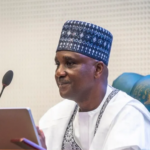In Nigeria, a country with a youthful population, the engagement of young people in politics is crucial for the nation’s progress and development. The youth represent a vibrant and dynamic segment of society, with fresh perspectives, innovative ideas, and a deep desire for change. Recognizing these potentials, efforts are underway to empower the next generation and actively involve them in the political landscape. In this article, we explore the importance of youth engagement in Nigerian politics, the challenges they face, and the transformative impact they can have on the nation’s future.
A call for inclusion and representation
Nigeria’s youth population constitutes a significant majority, with over 60 percent of Nigerians under the age of 30. Despite this demographic advantage, young people have historically faced barriers to meaningful political participation. However, there is a growing recognition of the need for their inclusion and representation in the decision-making processes.
Efforts are being made to create platforms for youth voices to be heard and heeded. Youth-focused organizations, political parties, and civil society groups are mobilizing young individuals, encouraging their active involvement in political activities, and amplifying their concerns. This shift towards inclusion acknowledges the invaluable contributions the youth can make to shaping Nigeria’s political landscape.
- Community accuses traditional rulers of land grabbing in Bauchi
- Kano gov’ship: Gov Yusuf closes case with SSG as lone witness
Empowering the youth: Education and capacity building
To effectively engage in politics, young Nigerians must be equipped with the necessary knowledge, skills, and opportunities. Education and capacity-building initiatives are essential in empowering the youth and nurturing their leadership potential.
Educational institutions and civil society organizations are taking steps to introduce political education programs, encouraging critical thinking, civic awareness, and a deeper understanding of democratic processes. By equipping young people with the tools to analyze political issues and engage in constructive dialogue, these initiatives are fostering a generation of politically conscious individuals.
In addition, mentorship programs, leadership training, and internships are being provided to nurture young leaders and expose them to the complexities of governance. These opportunities enable them to develop practical skills, build networks, and gain hands-on experience in political environments. Empowering the youth with knowledge and skills enhances their ability to contribute meaningfully to the political discourse.
Obstacles to youth engagement
Despite the progress made, significant challenges persist in youth engagement in Nigerian politics. Limited access to resources, political apathy, and a lack of representation in key decision-making bodies hinder the full participation of young Nigerians.
Financial constraints often prevent young individuals from running for political office or supporting political causes. Political campaigns require substantial funding, making it difficult for young candidates to compete with established and well-funded opponents. Addressing this issue requires the provision of financial support and the creation of avenues for young people to access resources to enable their political aspirations.
Furthermore, political apathy among young Nigerians remains a concern. Many feel disillusioned by the existing political system and disengaged from the electoral process. This disconnection can be attributed to a lack of trust in political institutions, inadequate representation of youth interests, and a perceived lack of opportunities for meaningful participation. To address this, efforts must be made to build trust, create platforms for dialogue, and demonstrate that young voices are valued and can bring about positive change.
The transformative potential of youth engagement
Despite these challenges, youth engagement in Nigerian politics holds immense transformative potential. The energy, passion, and fresh perspectives of young Nigerians can drive innovative solutions, challenge the status quo, and bring about positive change across various sectors.
When young people are given the opportunity to participate actively in politics, their impact can be far-reaching. They can champion issues such as education reform, employment opportunities, gender equality, and environmental sustainability. By amplifying their voices, young Nigerians can reshape policies, advocate for their communities, and inspire broader social change.
Moreover, youth engagement in politics fosters a sense of ownership and accountability among young individuals. It instils a commitment to the democratic process, encourages a culture of transparency, and holds political leaders accountable for their actions. By actively participating in the political arena, young Nigerians can contribute to building a more inclusive, responsive, and representative democracy.
Conclusion
Youth engagement in Nigerian politics is not merely an aspiration; it is a necessity for the nation’s progress and development. As Nigeria’s largest demographic group, young people have the potential to shape the country’s future in significant ways. Efforts to include and empower them in the political landscape are essential for a more inclusive, vibrant, and responsive democracy.
Through education, capacity building, increased representation, and the creation of platforms for meaningful participation, young Nigerians can drive transformative change. Overcoming the obstacles they face and embracing their potential as catalysts for progress will ensure that the voices and aspirations of Nigeria’s youth are not only heard but also acted upon.
By harnessing the energy and passion of the next generation, Nigeria can forge a path toward a more equitable, prosperous, and democratic future. It is incumbent upon stakeholders, political leaders, civil society organizations, and the youth themselves to collectively work towards creating an enabling environment that empowers young Nigerians and allows their voices to be central in shaping the nation’s political landscape.
Amina Salihu Alfa, a student of Mass Communication, Ahmadu Bello University, wrote from Zaria

 Join Daily Trust WhatsApp Community For Quick Access To News and Happenings Around You.
Join Daily Trust WhatsApp Community For Quick Access To News and Happenings Around You.


